Positions & Papers
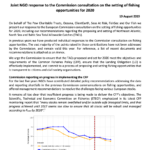
Joint NGO response to the Commission consultation on the setting of fishing opportunities for 2020 under the CFP
August 21, 2019
In response to the Commission Communication on fishing opportunities for 2020, The Pew Charitable Trusts, Oceana, ClientEarth, Seas At Risk, FishSec and Our Fish have provided a joint response.
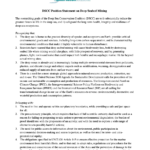
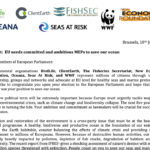
Joint NGO letter to new Parliament: “EU needs committed and ambitious MEPs to save our ocean”
July 15, 2019
In a letter to newly elected MEPs serving in the European Parliament for the next five years, environmental organisations BirdLife, ClientEarth, The Fisheries Secretariat, New Economics Foundation, Oceana, Seas At Risk, and WWF called on politicians to deliver on 8 concrete EU commitments that protect marine life, habitats and biodiversity. The letter highlights that "the EU already has the laws, obligations and commitments. Now we call on you to move from words to actions. We count on your determination in this challenge."
These commitments include "4. Fully implement the Common Fisheries Policy. 5. Eliminate Illegal, unreported and unregulated fishing, and strengthen fisheries control and enforcement; introduce fully documented fisheries. 6. Save the Mediterranean - the most overfished sea of the world - by reducing the excessive fishing effort, minimizing fishing impacts on vulnerable species and habitats and substantially improving the culture of compliance in the region."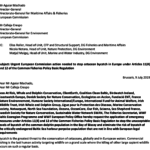
Joint NGO letter to European Commission – urgent action needed to stop cetacean bycatch
July 10, 2019
A coalition of 27 NGOs have written to the European Commission calling on them to implement emergency measures in order to protect cetaceans, such as dolphins and porpoises, killed and captured during unselective fishing operations. These bycatch killings contravene the EU Habitats Directive and the Common Fisheries Policy which aim to conserve biodiversity and ensure that fishing has a minimal impact on non-target species. The letter states: "Bycatch is the greatest threat to the conservation of cetaceans, globally and in European waters. Commercial fishing is the last human activity targeting wildlife on a grand scale where the killing of other large sapient wildlife occurs on such a regular basis.
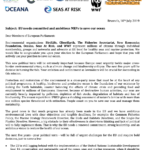
Joint NGO letter to MEPs: EU needs committed and ambitious MEPs to save our ocean
July 10, 2019
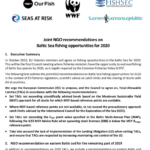
Joint NGO recommendations on Baltic Sea fishing opportunities for 2020
June 10, 2019
- Set TACs not exceeding scientifically advised levels based on the Maximum Sustainable Yield(MSY) approach for all stocks for which MSY-based reference points are available.
- Where MSY-based reference points are not available, to not exceed the precautionary approach catch limits advised by the International Council for the Exploration of the Sea (ICES).
- Set TACs not exceeding the FMSY point value specified in the Baltic Multi-Annual Plan (MAP), following the ICES MSY Advice Rule when spawning stock biomass (SBB) is below the MSY Btrigger reference point.
- Take into account the lack of implementation of the Landing Obligation (LO) when setting TACs, and ensure that TACs are respected by increasing monitoring and control of the LO.
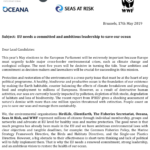
Joint NGO letter to European Parliament lead candidates
May 17, 2019
The environmental organisations BirdLife, ClientEarth, The Fisheries Secretariat, Oceana, Seas At Risk, and WWF are calling on the newly elected members of the European parliament to take “committed and ambitious leadership to save our ocean”. In a joint NGO letter to MEP lead candidates to the European Parliament elections on 23-26 May 2019, NGOs highlighted the need for the European Union to provide committed and ambitious leadership to save our ocean. Referring to commitments made under the UN Sustainable Development Goals, Common Fisheries Policy, Marine Strategy Framework Directive, EU biodiversity strategy and Birds & Habitats Directive we call on the EU to implement the laws and obligations to which it is committed. NGOs urge the fulfillment of eight crucial actions over the next five years in order to ensure the future of European seas and our collective future is protected. The European Green party replied stating "The European Green Party is glad to inform you that the Green Lead Candidates, Ska Keller and Bas Eikchout, commit on the crucial actions that you mention in your letter." The European People's Party replied saying "Combatting climate change and defending our environment are fundamental for our future. This is why fighting climate change is one of our election priorities....We would like to express our support for your work in defending our nature and oceans."
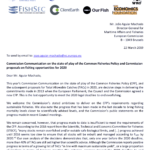
Joint NGO letter – Commission proposals on fishing opportunities for 2020
March 28, 2019
In the letter to the Commission regarding their proposals for fishing opportunities in 2020 the NGOs highlight that this is the last opportunity to meet the 2020 legal deadline to end overfishing.
EU Control Regulation Review – factsheets
March 15, 2019
On 6 November we have produced an updated and consolidated document: Joint NGO priorities on the revision of the EU Fisheries Control System
The following factsheets present the NGO priorities on the revision of the EU Control Regulation: Joint NGO priorities on the revision of the Control Regulation Remote Electronic Monitoring Sanctions Traceability Transparency IUU Small-scale fisheries The European Fisheries Control Agency (EFCA) These call on decision-makers to:- Ensure full compliance with the landing obligation;
- Adapt the general control framework to the control of technical measures;
- Maintain and improve the EU legal framework for enforcement and sanctions;
- Mandate the use of cost-efficient tracking devices and the electronic reporting of catches and fishing operations for small-scale vessels;
- Improve the control of recreational fisheries;
- Improve traceability requirements;
- Improve data management and sharing;
- Ensure the monitoring and control of fleet capacity;
- Effectively control fishing in restricted and marine protected areas;
- Introduce transparency requirements;
- Minimise the amendments to the EU IUU Regulation by staying within the scope of the Commission’s proposal and by strengthening only those provisions opened for review;
- Revise the European Fisheries Control Agency (EFCA) mandate.
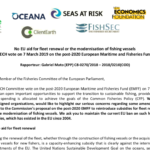
Joint NGO letter to MEPs on the reintroduction of harmful subsidies for fleet renewal and vessel modernisation
February 27, 2019
This joint NGO letter highlights our serious concerns regarding some amendments tabled to the European Commission’s proposal on the post-2020 European Maritime and Fisheries Fund to reintroduce subsidies for fleet renewal and the modernisation of fishing vessels. We ask MEPs to maintain the current EU ban on such harmful subsidies, which has existed in the EU since 2004. Funding the renewal of the fleet, whether through the construction of fishing vessels or the acquisition of fishing vessels for new fishers, is a capacity-enhancing subsidy that is clearly against the international commitments of the EU. The United Nations Sustainable Development Goal on the oceans, seas and marine resources (SDG 14) explicitly calls for the elimination of harmful fisheries subsidies that contribute to overcapacity and overfishing by 2020. The EU phased out aid for the construction of new vessels over a decade ago and is actively advocating for the prohibition of fisheries subsidies that contribute to overcapacity and overfishing during negotiations in the World Trade Organization (WTO). Proposing amendments to re-introduce these types of subsidies undermines the objectives of the CFP to end overfishing, jeopardises the EU position in the ongoing negotiations over fisheries subsidies at the WTO, and sends the wrong political signal from the EU to political leaders around the world.